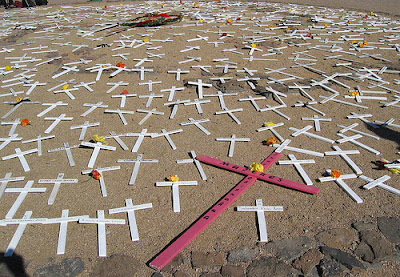Wednesday, November 16, 2011
Femicide
Globalization has taken its toll on the economy but has left a lasting effect on society, especially in Juarez, Mexico. On October 20th 2011, Cipriana Jurado, a social justice activist, spoke about the current femicide happening right now in Ciudad Juarez, Mexico. Femicide is the deliberate killing of women because of their gender. The Femicide occurring in Ciudad Juarez is connected with women working at maquiladoras. Maquiladoras are factories that are owned by private companies who set up these factories in foreign countries. Some of these maquiladoras are exempt from tariffs on their goods because of free trade policies. Over 1000 women have been violently and brutally murdered, most of who work at maquiladoras. Those 1000 women are only those of whose bodies have been found but there are many who have gone missing or have not been reported. Women, ages 12 and up, had been disappearing since 1993 but it was only until 1995 and 1997 that the media had taken notice after hundreds of bodies had been found dismembered, raped, mutilated, and disposed of horrendously.
In Making a Killing: Femicide, Free Trade, and La Frontera by Alicia Gaspar de Alba with Georgina Guzman, Gaspar de Alba states, “Few seriously examine the relationship between systematic violence against women and the changes in the social environments in a city that have allowed such violence to occur.” Alicia Gaspar de Alba also argues, “[T]he Ciudad Juarez murders are an extreme manifestation of the systematic patterns of abuse , harassment, and violence against women who work in the maquiladoras –treatment that is an attributable by-product of the privileges and lack of regulation enjoyed by the investors who employ them under the North American Free Trade Agreement (NAFTA).
More capital calls for a demand in cheap labor and an increase in productivity. American companies in Mexico have exploited and abused women who work at maquiladoras directly though NAFTA. NAFTA gives regulations and laws for U.S. companies in Mexico but do not give rules as to how these regulations and laws should be applied and even further does not explain the vernacular used in those documents. For example, one regulation in NAFTA states how there is a prohibition of forced labor but does not include what forced labor means, so in actuality forced labor could mean anything and companies take advantage of the that fact.
In these U.S companies, who are under NAFTA, women who work at maquiladoras, are not protected against abuse both physically and mentally, have no safety at home or in the workplace, and have minimal rights. According to Gaspar de Alba, maquiladora workers are, “Typically someone with little education, and is often a migrant from even poorer regions of the country [.]” Government and company officials stereotype these women by stating that the victims are frequently dressed to go to go out, have abusers as boyfriends, and lead men on. These governments are basically stating that women are at fault in their own murders for leading men on and getting involved with the wrong crowd.
It is the policies of NAFTA and the companies that should be held accountable for the horrors happening to women while working at the maquiladoras. The way to help these families and women is to educate yourselves on the issue and as Cipriana Jurado mentions, to write to your local government officials. The femicide in Ciudad Juarez is a gender, social, and economic issue that needs to be resolved or there will be a continuation of the femicide. The precedent has been set for others to enact a femicide and the only way to rid that precedent is to stop the current femicide.
Rubi Barragan (@rubibarragan)
Subscribe to:
Post Comments (Atom)


No comments:
Post a Comment